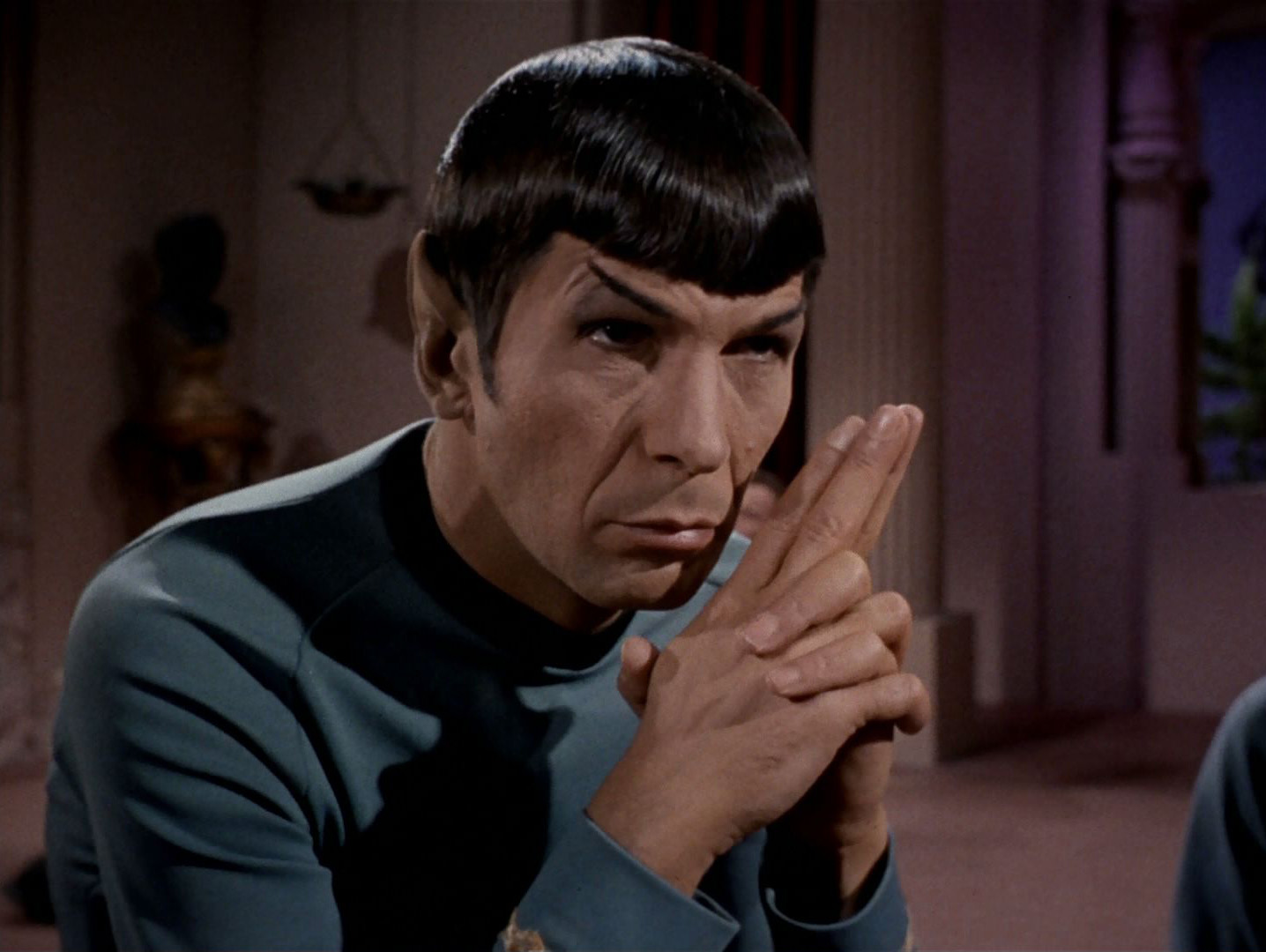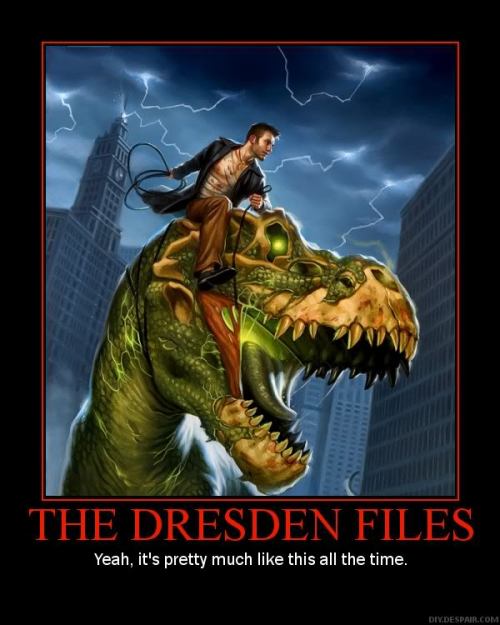Warning: This essay contains Spoilers for Cold
Days: A Novel of the Dresden Files[1]by Jim Butcher. While the dramatic conclusion is left
unrevealed, I would advise buying and reading first. Note, this is Book 14 of an Ongoing Series, so it may take
some time to get there, but believe me the journey is worth it for the
intricate, immersive and at once grim and riotously funny world that Butcher
crafts.
When one hears the word “Stoic”, one’s first thought is of
calm, rational, unmoved thinking, something like this:
 |
| He comes up if you Google "Stoic" |
This does not seem like a philosophical standpoint that
would relate to Harry Blackstone Copperfield Dresden, Protagonist of The
Dresden Files, the man who answers insults with conjured conflagration, who
will leap directly into the path of danger because a lady is in trouble[3]
and who once started narration with “The Building was on fire and it wasn’t my
fault.”[4]
 |
| The Zombie T-Rex powered by Polka makes perfect sense in context. |
Harry is just starting his employment as the Right Hand of
Mab, Queen of Winter.[5] Several things happen that are
important happen on his first day on the job. One, Mab tasks Cat Sith[6]
to follow Harry’s orders, to be his batman. Harry mostly uses this to get a Coke. Two, Harry meets “Kringle,” yes,
that Kringle, the Jolly Old Elf. Third, Mab, for reasons related to the plot,
tasks Harry to kill her daughter Maeve, the Lady of Winter.
Now, from previous books we know that there is a tenuous
peace between Winter and Summer.
They trade control of the world over at Midsummer and back at Yule,
etc. However, they don’t
like each other. In the Court of
Winter there is a general lack of passion and many of the figures are rather
grim, if hungry and malicious, often plotting, but acting out of reason, never
rashly.[7] Summer is much more passionate and open
and loving,[8]
though antagonistic towards Harry because he killed the Lady of Summer years
ago for totally noble world-saving reasons. However, blood is thicker than reason in the Faerie
Courts.
 |
| Maeve is basically a Hyperrealized version of Kesha Serbert's Stage Persona |
 |
| To the surprise of everyone who doesn't know their comparative mythology, Kringle is Odin in disguise. |
I mentioned Kringle.
When Harry meets him, he can’t help noting that “[He’s] freaking Santa
Claus!”[9] However, Kringle protests, stating that
he isn’t Santa Claus until after Halloween. He’s putting his foot down. This seems like a throwaway gag referencing the habit of
stores putting out Christmas Decorations in October September
August, however, it is also a nod to Stoicist philosophy. Harry is making sport of Kringle, who
is being forced to be something he is not, to act outside of his nature by the
mortal memetism of Santa Claus, which angers him. “For when does a Vine do badly,” asks Epicetus, “When it
acts against its nature.” Kringle
is afraid of being forced to act against his nature, and thus do badly, which
in the backstabbing Court of Winter means courting death.
I’ve mentioned Maeve and I’ve mentioned Cat Sith for a reason, to set up two characters who, it is revealed later in the book, are possessed by a force named Nemesis. This force corrupts people, causing them to act outside the bounds of their nature. It grants Maeve the power to lie, something no Faerie is able to do, and Cat Sith the power to defy Harry’s orders. Harry’s discovery that Cat Sith is possessed by Nemesis comes directly before his defeat, a metaphor for the way deviation from one’s role in the universe is to fall from grace[10]. This Nemesis is the new Big Bad that Cold Days is setting up for this Arc, as Nemesis is not defeated, only hindered. It is curious that the monster for this book is something as simple as people not acting in accordance with their natures, but then, that is the Antithesis of Stoicism. A Stoic would fear an external force causing him to act not in accordance with his Nature but in opposition to it, bringing dischord and disharmony. Cold Days is, for all accounts, a horror story for Stoicists, which gets even more terrifying as Harry learns more about the Natural Order of things.
In this book, Harry (and the readers) discover that Winter and Summer are not in balance, as thought, but that Winter outnumbers Summer a-hundred fold. However, Winter’s true purpose in all things is to hold back The Outsiders, Eldritch Abominations from beyond the furthest reaches of our Universe. Winter keeps them in check, whereas Summer keeps Winter in check. And, because Maeve is not acting in concert with Mab but in consternation to her, Winter is losing.
 |
| Like this only bigger. |
An important element of Stoicism, as discussed, is the
adherence to Nature above all else.
While this perspective is primarily attested to people, it is also in
some cases applied to the physical world.
For instance, while the Stoics generally derided the ideas of praying or
making supplications to the Gods, they did admit that reverent to the manifestations of God, such as the
planets, was all right. They saw
the planets as being highly in accord with Stoic philosophies, as they obeyed a
natural, unchanging order. The
stoics believed that everything was set out with a proper order, and that
passions would lead to problems due to deviation from that order.
 |
| "But for me, it was Teusday." |
The Outsiders are representations of the strife that comes
from deviance from that order.
Having no formal shape, no common physical features or natures apart
from a general desire to bring about an end of all things and a resistance to
magic, the manifestation of Nature, these chaotic antagonists are an anthropomorphization
of the antithesis of Stoic Order, which to me was the deciding factor in
calling this book an argument for Stoicism.
Now, to be fair, making the Big Bad a conglomerate of
Eldritch Abominations isn’t exactly a new move, and could be interpreted in
many ways, but it definitely ties in with Nemesis and Kringle’s refusal to be
Santa Claus, and its alignment with the argument for Stoicism comes through in
the universal agreement that the Outsiders must be stopped at all costs. However, Maeve, instead of helping Mab,
is making things worse by her machinations. Because Winter is not acting in accordance with the
Deterministic Nature that someone (probably God) laid out for it, chaos is
infecting the world. When
simplified down to these levels, it’s almost academic. The whole book plays out as a very long
cautionary tale. It’s really not
much different from Little Red Riding Hood or Hansel and Gretel. There are even villainous wolves
pretending aid and evil witches ensnaring children.
Now, why does this all matter? Well, for one, it is pursuit of deeper understanding for the
sake of deeper understanding, and understanding is its own reward. However, understanding the philosophy
of the dominant literature is an important element of understanding
society. The Dresden Files are one
of the most widely read series in the Urban Fantasy Genre. People who don’t even regularly read
books (that is, most of my friends) all picked up and read this one within a
week or so of its publication. It
still had its own display rack even two weeks after release in my local
bookstore. It was featured in The
DC Spotlight’s list of Books to Know for January 2013, the series as a whole
featuring in the Kansas City Star, The Seattle Post, the New York Times, and
that’s just over the last two years.
The series has some clout to it.
It speaks to something in a great many people in America, and
understanding what America is reading tells you more about America. And America, apparently, wants to have
a place in the world, wants to know what its role is and be able to live in
accordance with that, as opposed to seeking it out.
If you enjoyed this, maybe you'd like something I made in relation to Book 15?
[1] Butcher,
Jim. Cold Days: A Novel of the Dresden Files. New York: ROC 2012.
[2] Russel,
Bertrand. A History of Western Philosophy.
Simon&Schuster/Touchstone: New York 1967.
[3] To his
credit, he admits that his heroic chauvinism is a flaw.
[4] Butcher,
Jim. Blood Rites: A Novel of the
Dresden Files. New York: ROC
2004.
[5] There are
two Courts of Faeries, Winter and Summer, each with three Rulers, a Mother,
Queen, and Lady, with the Queens being the primary rulers, the Ladies being
party-girls and the Mothers being largely uninvolved in greater affairs,
spending most of their time chillaxing in a hut somewhere in the NeverNever.
[6] A figure
from Celtic Folklore. The Cat Sith
was never a friend, but only an enemy if angered.
[7] Lawful Evil
[8] Chaotic Good
[9] Cold Days, p.
38
[10] Or at least
to fall off of a boat.
No comments:
Post a Comment